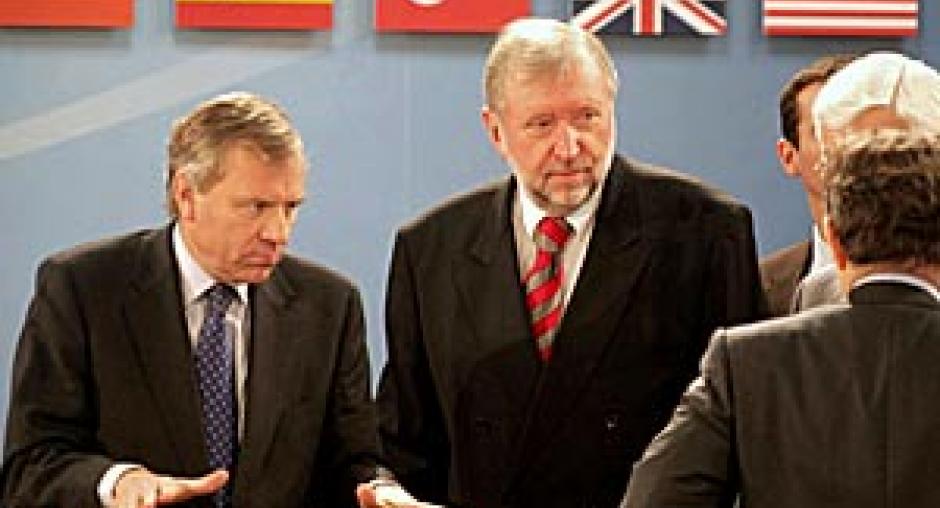Newsroom
OSCE Chairman, visiting NATO Headquarters, welcomes proposal for seminar on military doctrine
BRUSSELS 26 January 2005

(OSCE/BOBO)OSCE Chairman-in-Office Dimitrij Rupel (centre) and NATO Secretary General Jaap de Hoop Scheffer (left) attending the North Atlantic Council session, NATO Headquaters in Brussels, 26 January 2005 (OSCE/BOBO) Photo details
BRUSSELS, 26 January 2005 - The OSCE Chairman-in-Office, Slovenian Foreign Minister Dimitrij Rupel, on Wednesday welcomed the idea of holding an OSCE seminar on military doctrine.
"Due to its long-standing work in the field of disarmament, arms control and confidence-building measures, I believe the OSCE is the ideal place to discuss this topic," he said during a visit to NATO Headquarters.
A seminar on military doctrine would help strengthen the OSCE's politico-military dimension, one of the three cornerstones of its approach to security, the OSCE Chairman added.
"Bearing in mind the changes in the world order, technology and warfare, it would be useful to compare notes on contemporary military doctrines," he said.
Minister Rupel outlined the current situation in the OSCE, which has still not agreed a 2005 budget and new scales of contribution, in an address to the North Atlantic Council and in a meeting with NATO Secretary General Jaap de Hoop Scheffer.
"I will not hide from you that there is a sense of crisis in the OSCE," he said. "It is ironic - and troubling - that in this year when we should be celebrating our unity as a continent, there are signs that the common ground on which we stand may be shakier than we thought."
Criticism of the OSCE from the Russian Federation and some CIS countries should be taken seriously. "It is clear that we need to talk. The OSCE is the ideal forum for that," Minister Rupel said. "We have to listen to the voices of all OSCE states and to build on our strengths."
The Chairman-in-Office called for closer co-operation between the OSCE and NATO, as well as other international organizations that have an interest in European and international security, in areas such as the fight against terrorism, travel documents and container security, trafficking in small arms and light weapons and shoulder-carried missiles, which could endanger civilian aircraft.
"We also see increased co-operation with NATO in OSCE's activities in building peace and regional stability in the OSCE area", he added.
"Due to its long-standing work in the field of disarmament, arms control and confidence-building measures, I believe the OSCE is the ideal place to discuss this topic," he said during a visit to NATO Headquarters.
A seminar on military doctrine would help strengthen the OSCE's politico-military dimension, one of the three cornerstones of its approach to security, the OSCE Chairman added.
"Bearing in mind the changes in the world order, technology and warfare, it would be useful to compare notes on contemporary military doctrines," he said.
Minister Rupel outlined the current situation in the OSCE, which has still not agreed a 2005 budget and new scales of contribution, in an address to the North Atlantic Council and in a meeting with NATO Secretary General Jaap de Hoop Scheffer.
"I will not hide from you that there is a sense of crisis in the OSCE," he said. "It is ironic - and troubling - that in this year when we should be celebrating our unity as a continent, there are signs that the common ground on which we stand may be shakier than we thought."
Criticism of the OSCE from the Russian Federation and some CIS countries should be taken seriously. "It is clear that we need to talk. The OSCE is the ideal forum for that," Minister Rupel said. "We have to listen to the voices of all OSCE states and to build on our strengths."
The Chairman-in-Office called for closer co-operation between the OSCE and NATO, as well as other international organizations that have an interest in European and international security, in areas such as the fight against terrorism, travel documents and container security, trafficking in small arms and light weapons and shoulder-carried missiles, which could endanger civilian aircraft.
"We also see increased co-operation with NATO in OSCE's activities in building peace and regional stability in the OSCE area", he added.
